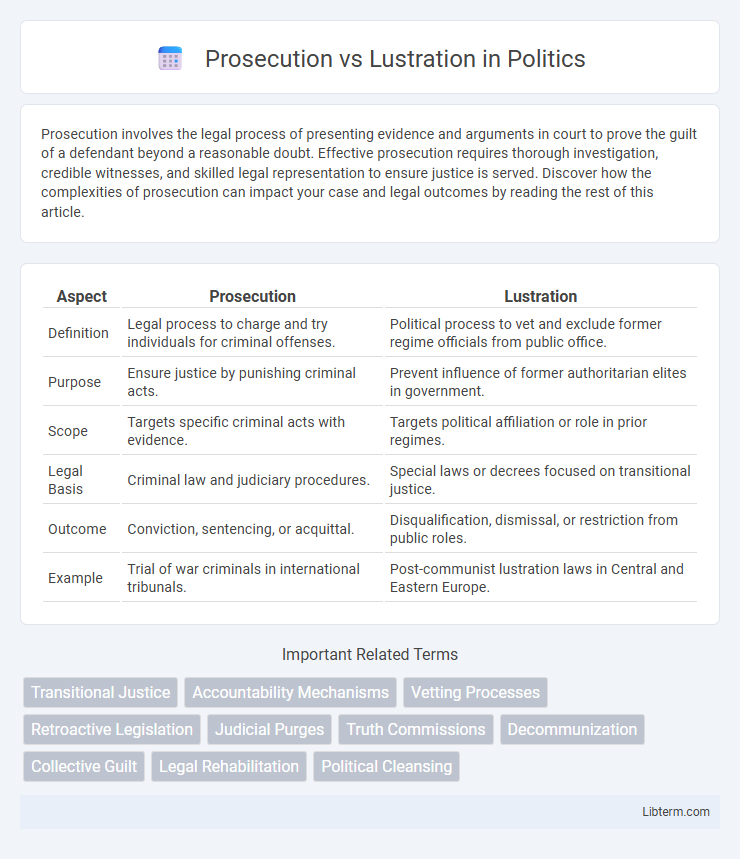Prosecution involves the legal process of presenting evidence and arguments in court to prove the guilt of a defendant beyond a reasonable doubt. Effective prosecution requires thorough investigation, credible witnesses, and skilled legal representation to ensure justice is served. Discover how the complexities of prosecution can impact your case and legal outcomes by reading the rest of this article.
Table of Comparison
| Aspect | Prosecution | Lustration |
|---|---|---|
| Definition | Legal process to charge and try individuals for criminal offenses. | Political process to vet and exclude former regime officials from public office. |
| Purpose | Ensure justice by punishing criminal acts. | Prevent influence of former authoritarian elites in government. |
| Scope | Targets specific criminal acts with evidence. | Targets political affiliation or role in prior regimes. |
| Legal Basis | Criminal law and judiciary procedures. | Special laws or decrees focused on transitional justice. |
| Outcome | Conviction, sentencing, or acquittal. | Disqualification, dismissal, or restriction from public roles. |
| Example | Trial of war criminals in international tribunals. | Post-communist lustration laws in Central and Eastern Europe. |
Understanding Prosecution and Lustration
Prosecution involves legally charging individuals suspected of criminal activities and pursuing judicial proceedings to establish guilt or innocence. Lustration refers to the process of vetting and excluding former officials, often tied to authoritarian regimes, from holding public office to ensure political and ethical accountability. Understanding prosecution centers on justice through the legal system, while lustration emphasizes political cleansing and institutional reform.
Historical Context of Prosecution and Lustration
Prosecution has historically served as a legal mechanism to hold individuals accountable for crimes, particularly in post-conflict or authoritarian regimes, ensuring justice through formal judicial processes. Lustration emerged primarily in Central and Eastern Europe after the Cold War, aimed at purging former communist regime collaborators from public office to restore democratic governance. This process differs from prosecution by focusing on political and ethical cleansing rather than criminal liability, reflecting the complex transitional justice needs of post-authoritarian societies.
Objectives: Justice vs. Reconciliation
Prosecution aims to achieve justice by holding individuals legally accountable for past crimes, ensuring culpability is officially recognized and punished. Lustration focuses on reconciliation by preventing those implicated in former regimes from holding public office, promoting societal healing through exclusion rather than legal punishment. Both processes address post-conflict accountability but differ in prioritizing retributive justice versus political restoration and social trust.
Legal Frameworks and Mechanisms
Prosecution entails formal legal proceedings against individuals for alleged crimes under established criminal law frameworks, often requiring comprehensive evidence and judicial processes to ensure accountability. Lustration involves administrative measures aimed at vetting and restricting former regime affiliates from holding public office, based primarily on political criteria rather than criminal convictions. Legal mechanisms for prosecution operate through courts with defined rights and appeals, while lustration relies on statutory regulations and specialized commissions to enforce political cleansings without necessarily invoking criminal litigation.
Case Studies: Global Applications
Case studies of prosecution versus lustration reveal varied global applications in transitional justice, with countries like Germany employing lustration to vet former Nazis from public office, while South Africa prioritized prosecution through the Truth and Reconciliation Commission to address apartheid-era crimes. In Eastern Europe, Poland and the Czech Republic implemented lustration policies to prevent former communist officials from holding government positions, contrasting with Chile's focus on prosecuting Pinochet-era human rights violations through legal trials. These differing approaches underscore the balance between accountability and political stability in post-conflict societies.
Human Rights Implications
Prosecution involves legally holding individuals accountable for crimes, directly impacting human rights by ensuring justice and deterring abuses. Lustration, a political process removing former regime officials, raises human rights concerns related to fairness, due process, and potential discrimination. Balancing prosecution and lustration is essential to uphold rule of law, protect individual rights, and promote societal reconciliation.
Political Impact and Societal Response
Prosecution directly holds individuals accountable for past abuses, often leading to polarized political environments and delayed reconciliation due to contested narratives. Lustration systematically bars former regime collaborators from public office, reshaping political landscapes by institutionalizing exclusion and fostering public trust in new governance. Societal response varies with prosecution sparking debates on justice versus revenge, while lustration evokes discussions on fairness and collective memory management.
Challenges and Limitations
Prosecution faces challenges such as gathering sufficient evidence, ensuring fair trials, and overcoming political influence, which can impede accountability in post-conflict societies. Lustration encounters limitations including potential violation of human rights, risk of political bias, and difficulties in defining clear eligibility criteria for exclusion from public office. Both mechanisms struggle with balancing justice, reconciliation, and the restoration of trust in transitional governance.
Effectiveness in Transitional Justice
Prosecution ensures accountability by legally charging individuals responsible for human rights abuses, creating a formal record and deterrence against future violations. Lustration serves as a preventive measure by barring former regime affiliates from key positions, promoting institutional reform and public trust. Effectiveness in transitional justice often depends on combining prosecution's legal rigor with lustration's political cleansing to balance justice and societal stability.
Future Perspectives on Accountability
Future perspectives on accountability emphasize the integration of prosecution and lustration to enhance transitional justice frameworks. Prosecution ensures legal consequences for past abuses, reinforcing rule of law, while lustration prevents implicated individuals from holding public office, fostering institutional integrity. Combining these mechanisms can strengthen democratic consolidation and promote sustainable governance in post-conflict or post-authoritarian societies.
Prosecution Infographic

 libterm.com
libterm.com